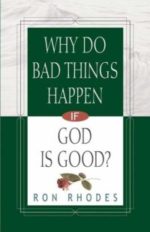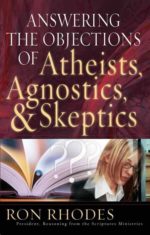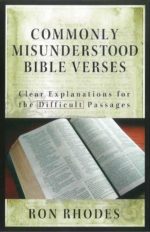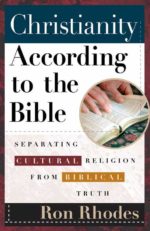Evil Does Not Disprove God is Good

Misunderstood Bible Verses Consider this trifold dilemma:
1. God is all-powerful.
2. God is all-good.
3. And yet, evil exists.
Many have struggled to make sense of this trifold dilemma. However one chooses to resolve it, I am convinced that the solution is not found in denying, compromising, or redefining God’s goodness.
In my thinking, there are three pivotal steps in answering those who suggest that the existence of evil proves God is not good:
1. We must address certain verses in the Bible that seem to portray God as doing bad things.
2. We must provide a biblical basis for God’s goodness.
3. We must seek to understand how our good God chose to allow free will among His creatures—and how this reality helps resolve the trifold dilemma.
Isaiah 45:7—God Does Not Create Evil
In Isaiah 45:7, God says, “I form light and create darkness; I make well-being and create calamity; I am the LORD, who does all these things.” The Hebrew word for calamity here does not mean “moral evil.” The plagues God inflicted on the Egyptians through Moses illustrate God’s “calamities.” These plagues involved not moral evil but rather calamitous events—judgments—engineered to bring the Egyptians to repentance. God’s good end—the deliverance of the Israelites from Egyptian bondage—was the result of this judgment against the Egyptians. God as the Judge of the earth can justly inflict such plagues on sinful human beings without having His character impugned with accusations of evil.
Proverbs 16:4—God Does Not Cause Wickedness
In Proverbs 16:4, we read, “The LORD has made everything for its purpose, even the wicked for the day of trouble.” This verse does not mean God specifically created certain wicked people for the sole purpose of destroying them or sending them to hell, as some have claimed. Scripture reveals God is not willing that any should perish (2 Peter 3:9). God loves the whole world of humanity (John 3:16). He “desires all people to be saved and to come to the knowledge of the truth” (1 Timothy 2:4). The price of redemption that Christ paid at the cross is made available to all people (1 John 2:2). These verses provide an essential backdrop to the proper interpretation of Proverbs 16:4. If we learn anything from such verses, it is that God cares for and loves all people.
The gist of Proverbs 16:4 is that, in the end, there will be commensurate justice corresponding to human actions. As The Expositor’s Bible Commentary puts it, “God ensures that everyone’s actions and their consequences correspond—certainly the wicked for the day of calamity.”[1] The Expanded Bible captures this idea in its translation of Proverbs 16:4: “He has even prepared a day of disaster [evil; harm; trouble] for evil people.”
Misunderstood Bible Verse: Exodus 4:21—God Hardened Pharaoh’s Heart
In Exodus 4:21, God spoke to Moses about Pharaoh: “I will harden his heart, so that he will not let the people go.” Ten times in the text of Scripture it is said that the Pharaoh hardened his own heart (Exodus 7:13,14,22; 8:15,19,32; 9:7,34,35; 13:15), and ten times that God hardened Pharaoh’s heart (4:21; 7:3; 9:12; 10:1,20,27; 11:10; 14:4,8,17). The Pharaoh hardened his own heart seven times before God first hardened it, though the prediction that God would do it preceded all.
God hardens on the same grounds as showing mercy. If human beings accept mercy, He will give it to them. If they will not, thus hardening themselves, He is only just and righteous in judging them with further hardening. Mercy is the effect of a right attitude; hardening is the effect of stubbornness or a wrong attitude toward God. It is like the clay and the wax in the sun. The same sunshine hardens one and softens the other. The responsibility is with the materials, not with the sun. Scripture reveals that the danger of resisting God is that He will eventually give us over to our own choices (see Romans 1:24-28).
Romans 9:13—God Hated Esau
In Romans 9:13, God affirmed: “Jacob I loved, but Esau I hated.” Contextually, the word “hate” should not be taken to mean that God had a negative psychological emotion that burned against Esau. Rather, the word should be understood as the Hebrew idiom it is—a word that means “to love less” (compare with Genesis 29:30-33). We might paraphrase the verse this way: “In comparison to my great love for Jacob, my feeling for Esau, whom I ‘love less,’ may seem like hatred.” Of course, God’s sovereign purposes for His people are related to Jacob and his descendants alone, not Esau or his lineage.
The truth is that no Bible verse indicates that God ever engaged in evil. God’s actions have always been in perfect harmony with His holy, righteous, just, and good nature.
God Is Good
First John 1:4 reveals that God is light, and “in him is no darkness at all.” This verse is particularly forceful in the Greek, which translates literally: “And darkness there is not in Him, not in any way.” John could not have said it more forcefully.
The Scriptures provide an abundance of evidence pointing to God’s goodness. Here is a brief sampling:
• “Oh, how abundant is your goodness” (Psalm 31:19).
• “Oh, taste and see that the LORD is good!” (Psalm 34:8).
• “Good and upright is the LORD” (Psalm 25:8).
• “For the LORD is good; his steadfast love endures forever” (Psalm 100:5).
• “Oh give thanks to the LORD, for he is good” (Psalm 106:1).
• “The LORD is good, a stronghold in the day of trouble (Nahum 1:7).
Our Good God Sovereignly Allows for Free Will
Some Christians believe that human beings do not truly have free will because God is sovereign over all things (Psalm 50:1; 66:7; 93:1; Isaiah 40:15; 1 Timothy 6:15). Contrary to this, I believe Scripture teaches both divine sovereignty and human free will.
It is certainly inscrutable to the finite understanding of human beings how both divine sovereignty and human free will can both be true, but both doctrines are taught in Scripture. In fact, both are often seen side by side in the span of a single Scripture verse.
For example, in Acts 2:23, we read of the crucified Jesus: “This Jesus, delivered up according to the definite plan and foreknowledge of God, you crucified and killed by the hands of lawless men.” Here we see divine sovereignty (“…according to the definite plan and foreknowledge of God”) and human free will (“…you crucified and killed by the hands of lawless men…”).
We also see both doctrines in Acts 13:48: “When the Gentiles heard this, they began rejoicing and glorifying the word of the Lord, and as many as were appointed to eternal life believed.” God’s sovereignty is clear (“as many as were appointed to eternal life”) as is man’s free will (“…believed”).
There are numerous indicators in Scripture that human beings have free will. In Matthew 23:37, Jesus is portrayed as speaking to Jews who had rejected Him: “O Jerusalem, Jerusalem, the city that kills the prophets and stones those who are sent to it! How often would I have gathered your children together as a hen gathers her brood under her wings, and you were not willing!” Christ (God) was willing to affectionately gather these Jews close to Him, but they volitionally (without compulsion from God) chose not to draw near to Him.
Likewise, we see man’s free will illustrated in Genesis following Adam and Eve’s sin. After they had committed their rebellious act by eating the forbidden fruit, God came into the Garden and asked, “What is this that you have done?” (Genesis 3:13). Adam and Eve could not shift responsibility back to God and say, “You decreed me to do it,” but rather they were found guilty of their own act of rebellion against the Lord.
Having said all this, allow me to suggest a resolution to the trifold dilemma:
• The original creation was “very good” (Genesis 1:31). There was no sin, no evil, no pain, and no death. The Edenic paradise was perfect!
• Today, the world is permeated with sin, evil, pain, and death. As Alvin Plantinga put it, “the whole range of human miseries, from restlessness and estrangement through shame and guilt to the agonies of daytime television—all of them tell us that things in human life are not as they ought to be.”[2] Today we live in a world of pain.
• What brought about the change? Scripture indicates the turn downward came for humanity when Adam and Eve used their God-given free wills to choose to disobey God. Prior to humanity’s misuse of free will, Lucifer had already misused his free will to rebel against God, along with a number of other angels (Isaiah 14:12-15; Ezekiel 28:11-19; Revelation 12:4). Lucifer then tempted Eve in the Garden of Eden (Genesis 3:1-7). The first human couple chose wrongly, and humans have been suffering ever since, continuing to misuse their free wills.
Fast-forward to the present day. Allow me to illustrate how free will can wreak havoc. George’s free-will choice to smoke cigarettes can bring about the evil of lung cancer into his life. His free choice can also bring evil upon others. For example, the secondhand smoke of the cigarettes can harm the health of George’s wife and children living in the house. As well, George’s smoking in bed in the middle of the night might end up killing everyone in the house when he falls asleep and the cigarette ignites the bed. This, in turn, might cause the flames to jump from his house to a neighbor’s house and kill all of its occupants. The smoke from these fires might then cause the person down the street with severe asthma to choke up and have to be rushed to the hospital for a breathing treatment. See what a mess George’s free will caused? And George is just one man. Cumulatively speaking, the free wills of humans worldwide collectively constitute a major culprit concerning why bad things happen in our world today.
Even natural evils—earthquakes, tornados, floods, and the like—are rooted in our wrong use of free choice. I noted in the previous article that as a result of humankind’s free-will sin against God in the Garden of Eden, the earth was cursed and the entire creation became subject to bondage and decay (Genesis 3:17; Romans 8:20-22). This makes the world ripe for natural disturbances. The good news is that there will be no natural disturbances or death in the new heavens and new earth when God puts an end to evil once and for all (see Revelation 21:4).
Of course, the fact that humans used their God-given free choice to disobey God in the Garden of Eden did not take God by surprise. God, in His omniscience, knew it would happen. In His wisdom, God knew that in the end, the temporary allowance of evil in the world (due to a misuse of free will) would be worth it. As C.S. Lewis put it, God in His omniscience “saw that from a world of free creatures, even though they fell, he could work out… a deeper happiness and a fuller splendor than any world of automata [robots] would admit.”[3]
Our present world is not the best of all possible worlds. However, in accordance with God’s sovereign plan, it is the best way TO the best possible world!
Some of the content of this article is derived from four of Ron Rhodes’ books, all of which may be consulted for further study:
Why Do Bad Things Happen If God Is Good (Harvest House Publishers, 2004).

Answering the Objections of Atheists, Agnostics, and Skeptics (Harvest House Publishers, 2006).

Commonly Misunderstood Bible Verses (Harvest House Publishers, 2008).

Christianity According to the Bible (Harvest House Publishers, 2006).

Go Deeper
- Relying on The Constant Companionship of The Holy Spirit – Package Offer
- Where is God When Life Hurts? – Package Offer
- Does God Exist? Arguments for the Existence of God
[1] The Expositor’s Bible Commentary, ed. Frank E. Gaebelein, in Accordance Bible Software, Oaksoft, 2003.
[2] Cornelius Plantinga, Jr. A Breviary of Sin: Not the Way It’s Supposed to Be (Grand Rapids, MI: Eerdmans, 1995), p. 2.
[3] C.S. Lewis; cited in Dan Story, Defending Your Faith (Nashville: Thomas Nelson, 1992), pp. 171-72, insert added.







